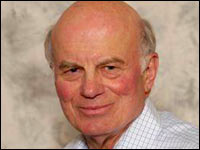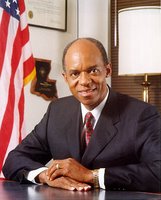
Late Wednesday evening, a friend of mine here in Chicago -- a conservative (!) member of the Fourth Estate, no less! -- sent an email to a selected few friends and family members. The subject of his email was a speech given by Ronald Reagan in West Berlin in June of 1987, at the Brandenburg Gate, wherein the President uttered perhaps the most powerful six words ever spoken by an American President in the 20th century: "Mr. Gorbachev, tear down this wall!"
Below you'll find selected excerpts from the speech. But first, a brief interlude by historian Douglas Brinkely, who was asked in 1999 to select and then write about the most patriotic speech given by an American President in the 20th century. He certainly had a lot from which to choose -- FDR's first inaugural ("We have nothing to fear but fear itself"); Harry Truman's address to the Congress in March of 1947, wherein he enunciated what came to be known as the Truman Doctrine ("I believe that it must be the policy of the United States to support free peoples who are resisting attempted subjugation by armed minorities or by outside pressures"); JFK's inaugural ("Ask not what your country can do for you, but what you can do for your country," and my personal favorite JFK line, "Let every nation know, whether it wishes us well or ill, that we shall pay any price, bear any burden, meet any hardship, support any friend, oppose any foe, in order to assure the survival and the success of liberty").
But Brinkley chose President Reagan's June 12, 1987 address in West Berlin. Here's what Brinkley wrote:
"The story of how Reagan came to deliver his freedom-tolling speech is worth retelling. In May 1987, White House speechwriter [now Hoover fellow] Peter Robinson had been assigned to draft an address for President Reagan’s upcoming journey to Berlin, a teeming city that was celebrating its 750th anniversary. Unfortunately, Berlin—although one of the blessed centers of Europe, with its Bauhaus architecture, imposing Reichstag, Tiergarten Park, and smoky cabarets—was divided by a concrete barrier and encircled in barbed wire.
"The Berlin Wall, erected in August 1961, was a monstrous affront to Jeffersonian democracy, human rights, common decency, and laissez-faire capitalism. It had become an ugly, drab symbol of Soviet totalitarianism gone haywire. Obviously any society that had to wall in citizens or, as Reagan put it, “had to pen its people up like farm animals,” was committing an enormous affront to the very notion of justice.
"Not content to just sit at his White House desk to draft such an important international speech, Robinson flew to Berlin, took the pulse of the city, and asked a lot of questions. It was at a dinner party, however, that Robinson came up with the simple but powerful “tear down this wall” phrase. When the host of the party, Dieter Eltz, a retired World Bank official, was asked about the wall, she suddenly made a fist with one of her hands and slapped it into the palm of her other and said, “If this man Gorbachev is serious with this talk of glasnost and perestroika, he can prove it. He can get rid of this wall.”
"Robinson had the line he was looking for, the centerpiece of the thirty-minute speech Reagan would deliver. When Reagan read the first draft of the Robinson speech he loved it, particularly the part about the wall having to come down. But the State Department and National Security Council were in an uproar. They pleaded with the president to drop the inflammatory line about the wall, which they considered antagonistic in the extreme. A flurry of telephone calls and memoranda circulated, insisting that the Robinson speech be thrown away, or at least seriously rewritten.
"America’s top foreign policy experts were vehement that Reagan not deliver the so-called crude and unduly provocative speech, which would only incite friction with the Kremlin. Even on the morning that Reagan arrived in Berlin, top aides pleaded with the president not to deliver the Robinson speech. Reagan told his top advisers that he would consider their recommendation. But on the limousine ride to the Brandenburg Gate, Reagan told his deputy chief of staff, Ken Duberstein, that he just had to deliver the powerful line about tearing down the wall. With an “aw shucks” smile, he poked Duberstein in the ribs and said, “The boys at State are going to kill me, but it’s the right thing to do.”
"Ronald Reagan had the self-confidence to pull off a clarion call for democracy on that June afternoon. Today, the speech stands as a permanent testimony to the power of presidential rhetoric and to one man’s inclination to ignore the conventional wisdom and follow his own beliefs. And isn’t that what we expect from our presidents?"
And now to the speech itself: (selected excerpts below)
"We come to Berlin, we American presidents, because it's our duty to speak, in this place, of freedom...
"Our gathering today is being broadcast throughout Western Europe and North America. I understand that it is being seen and heard as well in the East. To those listening throughout Eastern Europe, a special word: Although I cannot be with you, I address my remarks to you just as surely as to those standing here before me. For I join you, as I join your fellow countrymen in the West, in this firm, this unalterable belief: Es gibt nur ein Berlin. [There is only one Berlin.]
"Behind me stands a wall that encircles the free sectors of this city, part of a vast system of barriers that divides the entire continent of Europe. From the Baltic, south, those barriers cut across Germany in a gash of barbed wire, concrete, dog runs, and guard towers. Farther south, there may be no visible, no obvious wall. But there remain armed guards and checkpoints all the same--still a restriction on the right to travel, still an instrument to impose upon ordinary men and women the will of a totalitarian state. Yet it is here in Berlin where the wall emerges most clearly; here, cutting across your city, where the news photo and the television screen have imprinted this brutal division of a continent upon the mind of the world. Standing before the Brandenburg Gate, every man is a German, separated from his fellow men. Every man is a Berliner, forced to look upon a scar.
"President von Weizsacker has said, "The German question is open as long as the Brandenburg Gate is closed." Today I say: As long as the gate is closed, as long as this scar of a wall is permitted to stand, it is not the German question alone that remains open, but the question of freedom for all mankind. Yet I do not come here to lament. For I find in Berlin a message of hope, even in the shadow of this wall, a message of triumph...
"In the Reichstag a few moments ago, I saw a display commemorating this 40th anniversary of the Marshall Plan. I was struck by the sign on a burnt-out, gutted structure that was being rebuilt. I understand that Berliners of my own generation can remember seeing signs like it dotted throughout the western sectors of the city. The sign read simply: "The Marshall Plan is helping here to strengthen the free world." A strong, free world in the West, that dream became real. Japan rose from ruin to become an economic giant. Italy, France, Belgium--virtually every nation in Western Europe saw political and economic rebirth; the European Community was founded.
"In West Germany and here in Berlin, there took place an economic miracle, the Wirtschaftswunder. Adenauer, Erhard, Reuter, and other leaders understood the practical importance of liberty--that just as truth can flourish only when the journalist is given freedom of speech, so prosperity can come about only when the farmer and businessman enjoy economic freedom. The German leaders reduced tariffs, expanded free trade, lowered taxes. From 1950 to 1960 alone, the standard of living in West Germany and Berlin doubled.
"Where four decades ago there was rubble, today in West Berlin there is the greatest industrial output of any city in Germany--busy office blocks, fine homes and apartments, proud avenues, and the spreading lawns of parkland. Where a city's culture seemed to have been destroyed, today there are two great universities, orchestras and an opera, countless theaters, and museums. Where there was want, today there's abundance--food, clothing, automobiles--the wonderful goods of the Ku'damm. From devastation, from utter ruin, you Berliners have, in freedom, rebuilt a city that once again ranks as one of the greatest on earth. The Soviets may have had other plans. But my friends, there were a few things the Soviets didn't count on--Berliner Herz, Berliner Humor, ja, und Berliner Schnauze. [Berliner heart, Berliner humor, yes, and a Berliner Schnauze.]
"In the 1950s, Khrushchev predicted: "We will bury you." But in the West today, we see a free world that has achieved a level of prosperity and well-being unprecedented in all human history. In the Communist world, we see failure, technological backwardness, declining standards of health, even want of the most basic kind--too little food. Even today, the Soviet Union still cannot feed itself. After these four decades, then, there stands before the entire world one great and inescapable conclusion: Freedom leads to prosperity. Freedom replaces the ancient hatreds among the nations with comity and peace. Freedom is the victor....
"There is one sign the Soviets can make that would be unmistakable, that would advance dramatically the cause of freedom and peace.
"General Secretary Gorbachev, if you seek peace, if you seek prosperity for the Soviet Union and Eastern Europe, if you seek liberalization: Come here to this gate! Mr. Gorbachev, open this gate! Mr. Gorbachev, tear down this wall!
I understand the fear of war and the pain of division that afflict this continent-- and I pledge to you my country's efforts to help overcome these burdens. ...
"We must remember a crucial fact: East and West do not mistrust each other because we are armed; we are armed because we mistrust each other. And our differences are not about weapons but about liberty. When President Kennedy spoke at the City Hall those 24 years ago, freedom was encircled, Berlin was under siege. And today, despite all the pressures upon this city, Berlin stands secure in its liberty. And freedom itself is transforming the globe.
"In the Philippines, in South and Central America, democracy has been given a rebirth. Throughout the Pacific, free markets are working miracle after miracle of economic growth. In the industrialized nations, a technological revolution is taking place--a revolution marked by rapid, dramatic advances in computers and telecommunications.
"In Europe, only one nation and those it controls refuse to join the community of freedom. Yet in this age of redoubled economic growth, of information and innovation, the Soviet Union faces a choice: It must make fundamental changes, or it will become obsolete.
"Today thus represents a moment of hope. We in the West stand ready to cooperate with the East to promote true openness, to break down barriers that separate people, to create a safe, freer world. And surely there is no better place than Berlin, the meeting place of East and West, to make a start. ...
"Perhaps this gets to the root of the matter, to the most fundamental distinction of all between East and West. The totalitarian world produces backwardness because it does such violence to the spirit, thwarting the human impulse to create, to enjoy, to worship. The totalitarian world finds even symbols of love and of worship an affront. Years ago, before the East Germans began rebuilding their churches, they erected a secular structure: the television tower at Alexander Platz. Virtually ever since, the authorities have been working to correct what they view as the tower's one major flaw, treating the glass sphere at the top with paints and chemicals of every kind. Yet even today when the sun strikes that sphere--that sphere that towers over all Berlin--the light makes the sign of the cross. There in Berlin, like the city itself, symbols of love, symbols of worship, cannot be suppressed.
"As I looked out a moment ago from the Reichstag, that embodiment of German unity, I noticed words crudely spray-painted upon the wall, perhaps by a young Berliner: "This wall will fall. Beliefs become reality." Yes, across Europe, this wall will fall. For it cannot withstand faith; it cannot withstand truth. The wall cannot withstand freedom ... "













